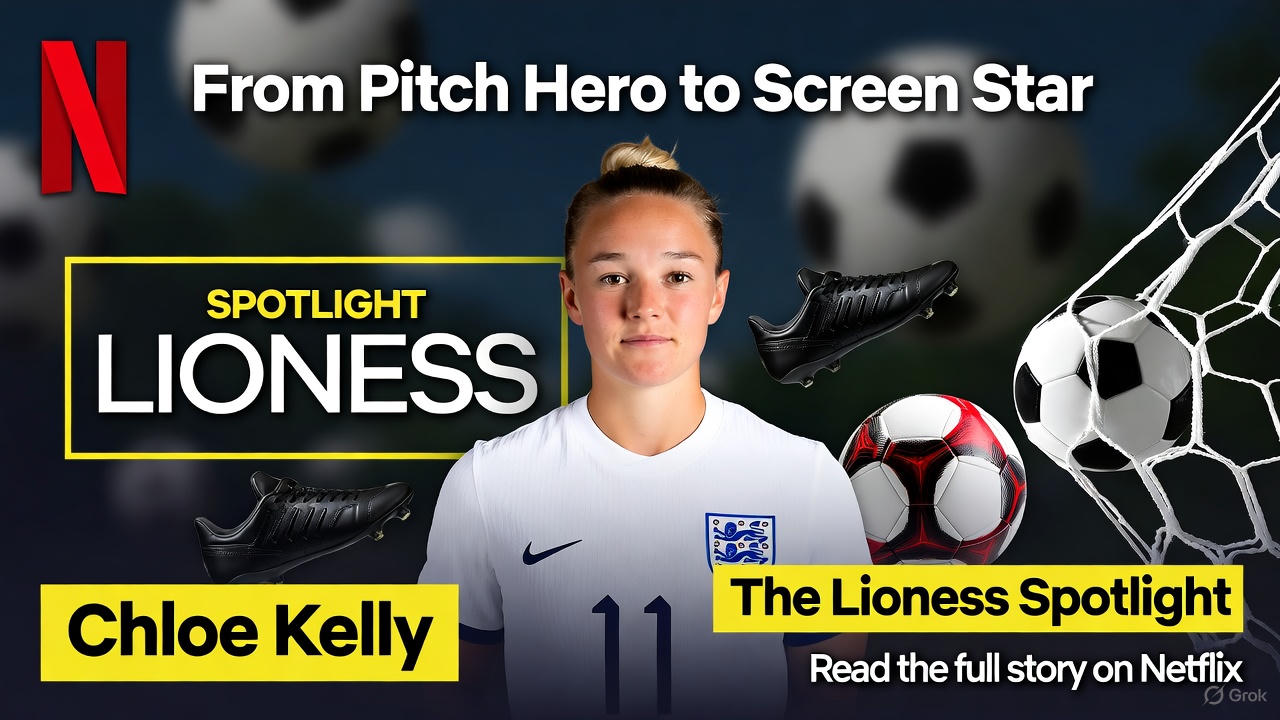In the electrifying world of women’s football, few stories capture the raw passion, unyielding grit, and triumphant glory quite like that of Chloe Kelly. Born on February 15, 1998, in Sydney, Australia, to British parents, Kelly’s early years were a whirlwind of relocation—from the sun-soaked pitches of Australia to the bustling streets of West London.
It was in Ealing, amid the concrete cages of Southall’s Windmill Park Estate, that her legend began to take shape. As the youngest of seven siblings—including five older brothers who treated her like one of the lads—Kelly honed her skills in unforgiving street football. “I was rarely without a ball at my feet,” she later reflected, crediting those cage battles for forging her fearless dribbling and creative flair. These weren’t polished academies; they were gritty enclosures where resilience was non-negotiable, and every goal felt like a small rebellion against the odds stacked against young girls in a male-dominated sport.
Kelly’s professional ascent was meteoric yet marked by setbacks that tested her mettle. Joining Arsenal’s academy at age eight, she debuted for the senior team at 16, becoming the Gunners’ youngest-ever player. A loan spell at Everton in 2017 sharpened her edge, but it was her move to Manchester City in 2019 that catapulted her into stardom. There, she netted 19 goals in her debut season, earning the PFA Women’s Players’ Player of the Year nod. Yet, glory came laced with pain. In 2022, an ACL tear sidelined her for nine agonizing months, plunging her into isolation. “It feels like you don’t have any worth, not playing your sport,” she admitted, her voice cracking in interviews. The mental toll was brutal, but Kelly emerged fiercer, channeling that darkness into fuel. Off the pitch, her life bloomed too—marrying long-term partner Scott Moore in a lavish Cheshire wedding at Merrydale Manor in July 2024, where nerves rivaled pre-match jitters, surrounded by white florals and loved ones.
But it’s on the grand stage where Kelly truly roars. Enter the Lionesses, England’s women’s national team, and their seismic 2022 UEFA Women’s Euro triumph. As extra time ticked down in the Wembley final against Germany on July 31, 2022, Kelly—fresh off injury—subbed in and delivered the knockout blow. Her extra-time strike, a clinical finish past keeper Merle Frohms, sealed a 2-1 victory, England’s first major trophy in 56 years. Shirt off, sprinting across the pitch in her sports bra, Kelly’s exuberant celebration became an iconic emblem of unapologetic joy. “We are footballers but we are human beings,” she later quipped, embodying the Lionesses’ ethos of vulnerability amid victory. The moment not only etched her into folklore but ignited a surge in girls’ football participation across the UK.
Fast-forward to 2025, and Kelly’s narrative evolves from pitch warrior to screen sensation. Netflix’s “Lionesses: How Football Came Home,” a riveting 2022 documentary directed by Poppy de Villeneuve, offers unprecedented behind-the-scenes access to that Euro odyssey. Featuring intimate footage of Kelly’s heroics—from Alessia Russo’s audacious back-heel against Sweden to her penalty redemption— the film dissects the squad’s chemistry under coach Sarina Wiegman. It’s more than highlights; it’s a tapestry of triumphs and tears, showcasing Kelly’s banter with teammates like Mary Earps and Fran Kirby, and the cultural quake of “football coming home” for women. Critics hailed it a “feelgood triumph” (IMDb rating: 7.8), blending archival gems with raw emotion to humanize these icons.
Yet Kelly’s spotlight burns brighter still. At Euro 2025, she scripted history anew: assisting Russo’s equalizer against Spain before burying the decisive penalty in the shootout, clinching back-to-back glory. Her Omagh-rooted family—tracing football lineage to great-grandfather Henry in the 1930s—watched in rapt awe, a relative quipping her “Omagh blood” fueled the win. Now at Arsenal, with over a million Instagram followers, Kelly transcends sport. She’s a beacon for the next generation, her cage-to-crown journey proving dreams aren’t gendered. As Netflix amplifies her tale, one thing’s clear: Chloe Kelly isn’t just a Lioness—she’s the roar that echoes eternal, from Wembley’s roar to streaming screens worldwide.



